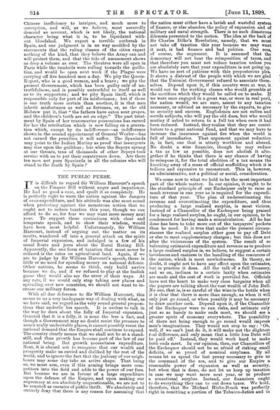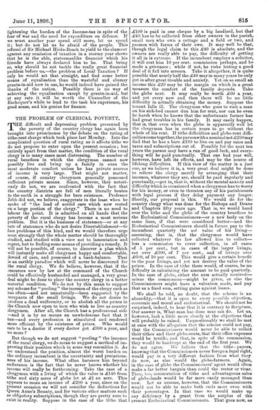THE PUBLIC PURSE.
IT is difficult to regard Sir William Harcourt's speech on the Finance Bill without anger and impatience. He had so good a case, and spoilt it so completely. He is perfectly right to warn the nation against the dangers of over-expenditure, and his attitude was also most sound when protesting against the monstrous notion that we ought not to reduce taxation this year, though we can afford to do so, for fear we may want more money next year. To support these contentions with clear and temperate speech, and to show their wisdom, would have been most helpful. Unfortunately, Sir William Harcourt, instead of arguing out the matter on its merits, wandered off into a general attack on the spirit of Imperial expansion, and indulged in a few of his mm1 flouts and jeers about the Rural Rating Bill. Apparently, the one form of taxation that must never be reduced is the rates on agricultural land. Again, if we are to judge by Sir William Harcourt's speech, there is little or no need for spending money on national defence. Other nations, he seems to think, only build navies because we do, and if we refused to play at the foolish game they would also see the error of their ways. At any rate, if we would only stop taking new places and spreading over new countries, we should not want to in- crease our military forces.
With all due deference to Sir William Harcourt, this seems to us a very inadequate way of dealing with what, as we have said, we regard as the very sound general proposi- tions that underlie his speech. It is useless to talk in the way he does about the folly of Imperial expansion. Granted that it is a folly, it is none the less a fact, and though a Government may no doubt resist the pressure to annex really undesirable places, it cannot possibly resist the national demand that the Empire shall continue to expand. 'The country clearly means that we shall not be at a stand- still, and thus growth has become part of the law of our national being. But growth necessitates expenditure. Next, it is absurd not to recognise that our wealth and prosperity make us envied and disliked by the rest of the world, and to ignore the fact that the jealousy of our neigh- bours may some day take an active shape. That being so, we must arm, even if this arming brings more com- petitors into the field and adds to the power of our foes. But because we are in favour of a large expenditure ,upon the defence of the Empire, and upon making our supremacy at sea absolutely unquestionable, we are not to be counted as enemies of public thrift. We absolutely and entirely deny that there is any reason for assuming that the nation must either have a lavish and wasteful system of finance, or else abandon the policy of expansion and of military and naval strength. There is no such disastrous dilemma presented to the nation. The idea at the back of Sir Charles DMA Resolution, namely, that we must not take off taxation this year because we may want it next, is bad finance and bad politics. One sees, of course, the argument. It is assumed that the democracy will not bear the reimposition of taxes, and that therefore you must not reduce taxation unless you are absolutely sure that your expenditure is not going up. We have no sort of patience with this preposterous plea. It shows a distrust of the people with which we are glad that the Unionist Government refused to associate them- selves. Depend upon it, if this country were at war, it would not be the working classes who would grumble at the sacrifices which they would be called on to make. If we were once engaged in a great war, or were in real peril, the nation would, we are sure, assent to any taxation necessary, or advised. as necessary by the experts, to give us security and success. Englishmen are not sullen and servile subjects, who will pay the old dues, but who would mutiny if asked to return to a full tax when once it had been reduced. Instead, they realise that they are contri- butors to a great national fund, and that we may have to increase the insurance against fire when the world is full of incendiaries. That argument against reduction is, in fact, one that is utterly worthless and absurd. No doubt a wise financier, though he may reduce a tax as low as possible, does not abolish it alto- gether if he thinks that there is any chance of having to reimpose it, for the total abolition of a tax means the knocking away of a mass of official scaffolding which it is tedious and expensive to reconstruct. This is, however, an administrative, not a political or social, consideration.
We come now to what we hold to be the most important part of the whole matter. In our opinion, it ought to be the standard principle of our Exchequer only to raise as much revenue in one year as is required for the expendi- ture of that year. The plan of underestimating the revenue and overestimating the expenditure, and thus producing a large realised surplus, is most vicious. Instead of a Chancellor of the Exchequer being praised for a large realised surplus, he ought, in our opinion, to be condemned for having made a miscalculation. All he has done has been to take more out of the taxpayers' pockets than he need. It is true that under the present circum- stances the realised surplus either goes to pay off Debt or else to meet supplementary charges ; but this does not alter the viciousness of the system. The result of so balancing estimated expenditure and revenue as to produce a large realised surplus is, we believe, to suggest a certain lavishness and easiness in the handling of the resources of the nation, which is most unwholesome. In theory, no doubt, it ought not to have any effect upon the estimates, but in practice it does. All the talk of a full Treasury, and so on, inclines to a certain laxity when estimates are made and the cost of work is provided for. Officials have not the heart to make very close bargains when all the papers are talking about the vast wealth of John Bull. No one, that is, is so careful of the wine in the bottle when it is clear that there is more than enough, as when it will only just go round, or when possibly it may be necessary to draw another cork. Depend upon it, if the Chancellor of the Exchequer were to run risks, and estimate only just so as barely to make ends meet, we should see a greater spirit of economy everywhere. The possibility of there not being enough to go round would impress men's imaginations. They would not stop to say : Oh, well, if we can't just do it, it will make not the slightest real difference, and only mean that a little less Debt will be paid off.' Instead, they would work hard to make both ends meet. In our opinion, then, our Chancellors of the Exchequer should not be so afraid of risking small deficits, or so proud of nominal surpluses. By all means let us spend the last penny necessary to give US the command of the sea, and to give our Empire a reasonable power of expansion as well as security, but when that is done, do not let us keep up taxation in case we may want more next year, or to produce a sensational surplus. Instead, our financiers ought to do everything they can to cut down taxes. We hold, therefore, that Sir Michael Hicks-Beach was perfectly right in remitting a portion of the Tobacco-duties and in lightening the burden of the Income-tax in spite of the fear of war and the need for expenditure on defence. If we must another year spend still more, let us spend it; but do not let us be afraid of the people. This refusal of Sir Michael Hicks-Beach to yield to the clamour against any remission of taxation in a stormy year shows that he is the able, statesmanlike financier which his friends have always declared him to be. That being so, why should he not tackle the really great financial problem before us,--the problem of Local Taxation ? If only he would set that straight, and find some better means of equalisation than the wasteful and clumsy grants-in-aid now in use, he would indeed have gained the thanks of the nation. Possibly there is no way of achieving the equalisation except by grants-in-aid, but at any rate it will be worth the Chancellor of the Exchequer's while to lend to the task his experience, his good sense, and his genius for finance.







































 Previous page
Previous page